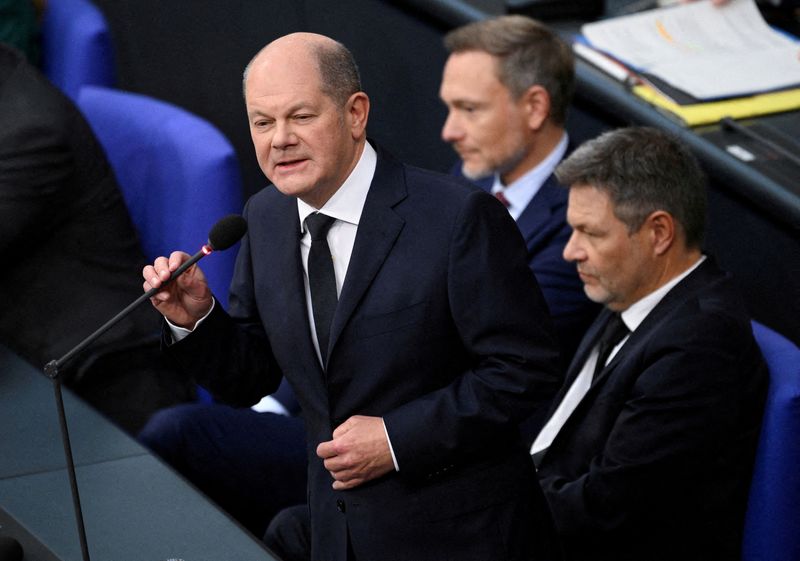By Holger Hansen and Riham Alkousaa
BERLIN (Reuters) -The German government has imposed a freeze on most new spending commitments in what officials on Tuesday said was a necessary step as Chancellor Olaf Scholz's coalition struggled to find a way out of a deepening budget crisis.
The government's spending plans were thrown into disarray by a court ruling last week that blocked the government from transferring 60 billion euros ($65 billion) in unused funds from the pandemic towards green initiatives, potentially starving some German industry of support to keep it competitive.
The verdict has compounded tensions in the loveless three-way coalition between Scholz's ruling Social Democrats Party (SPD), the pro-spending Greens and fiscally conservative Free Democrats (FDP) over whether to suspend self-imposed limits on raising new debt.
A Forsa poll showed that while support for the ruling parties together is as low as 34%, some 58% of Germans expect the trio to continue to govern until the next election in 2025.
The finance ministry has frozen future spending pledges across almost the entire federal budget, a letter by the budget state secretary showed, in a sign of how seriously it was taking the potential fallout to its finances.
The measure applies to all ministries and a 200 billion-euro fund that was set up to support companies through the pandemic and the energy crisis after Russia's invasion of Ukraine.
LEGAL CHALLENGE?
Berlin has blocked spending from the Economic Stabilisation Fund for this year after the court ruling, a source close to the finance ministry said on Tuesday.
The 200-billion-euro fund has come under threat by a prospective legal challenge from the resurgent main opposition Christian Democrats (CDU), which had brought the successful lawsuit against the so-called Climate and Transformation Fund last week.
The government wants to close the stabilisation fund by the end of the year, a government source told Reuters.
Economy Minister Robert Habeck has warned that the court ruling could severely hit Germany's ability to support its industry through a green transition and keep jobs and value creation from moving abroad.
That could include planned chip factories, the expansion of the battery supply chain and the decarbonisation of steel, government sources said on Monday.
"These funds are not an add-on that one can carelessly do without ... the loss to the economy if investments were not made now would be even greater," Habeck said at a digital summit in the eastern city of Jena.
So far, the coalition is sticking to its timetable of completing consultations for next year's budget, a member of the parliamentary budget committee said. The lower house is due to vote on the budget on Dec. 1.
DEBT BRAKE SUSPENSION?
Pressure is mounting within the SPD for the government to change a constitutionally enshrined debt brake to free up more spending, a move Finance Minister Christian Lindner has opposed as the brake is sacrosanct to many within his FDP.
"The debt brake in its current form is not suitable for the challenges of the future, as the constitutional court ruling ... has shown," said the leaders of the SPD parliamentary groups in the Bundestag lower house, European Parliament and states.
"There is no avoiding the fundamental reform of this brake on the future," they said in a joint resolution.
Berlin is considering suspending the debt brake this year again, a government source said, noting its justification for this would have to follow the guidelines laid out in the court ruling. The brake was lifted in 2020 until 2022 to ease the economic fallout from COVID and Russia's invasion of Ukraine.
Public opinion appears to be divided on how the government, whose popularity has sunk amid a weak economy and rising inflation, should proceed.
According to a survey by the RTL/ntv broadcaster, 44% of Germans believe the government should plug budget holes by making cuts elsewhere, while 38% think it should largely forgo projects that had been earmarked in the 60 billion-euro fund.
The CDU on Tuesday said the 2024 budget as it stands was not fit for purpose as a result of the court verdict.
However, there were also signs that the CDU's decision to take the government to court could rebound on federal states where the party heads the local government.

Hendrik Wuest, the state premier of the CDU-run government in North Rhine-Westphalia, said the federal government had to ensure that money kept flowing to industry especially energy-intensive companies, in his state to protect jobs.
($1 = 0.9168 euros)